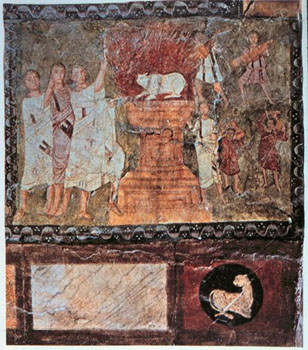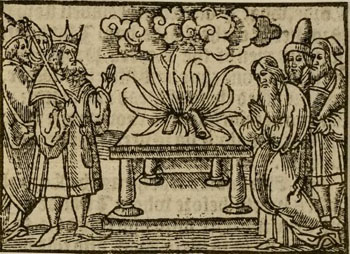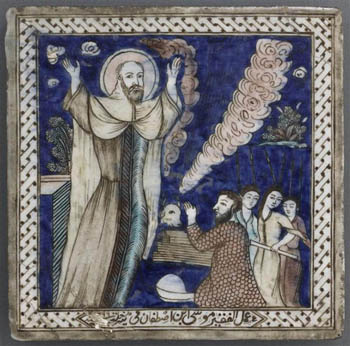"If The Lord is God, Follow Him"
Elijah and the Prophets of Baal
For Sunday June 2, 2013
Lectionary Readings (Revised Common Lectionary, Year C)
1 Kings 18:20–39 or 1 Kings 8:22–23, 41–43
Psalm 96
Galatians 1:1–12
Luke 7:1–10
Back in 1984 Phyllis Trible published a book called Texts of Terror about the Bible's cruel treatment of women. Ever since then, her catchy title has served as a proxy for all sorts of violence that's contained in the Bible. This week's story about Elijah's slaughter of the 450 prophets of Baal is a case in point. You read the story and about all you can say is, "Wow."
The story is especially vexing because it combines two problems for any religion — religious pluralism ("My God's better than your god") and sacred violence ("I'll slaughter you if you disagree"). Like most of life's important questions, a short essay can't do justice to these complex problems. But we can make a start.
 |
Elijah on Mt. Carmel, Dura Europos synagogue, c. 245 CE. |
In his book Laying Down the Sword; Why We Can't Ignore The Bible's Violent Verses (2011), Philip Jenkins examines the most terrifying texts of all — those in which God commands his people to exterminate their enemies without mercy. He includes a table of nineteen passages with "the most disturbing conquest texts."
For example, there's Deuteronomy 7:1-2: "Thou shalt smite them, and utterly destroy them; thou shalt make no covenant with them, nor shew mercy unto them." In 1 Samuel 15 God even killed king Saul precisely because he spared the Amalekite king Agag. Samuel then "hewed Agag in pieces before the Lord in Gilgal."
Today we would call these war crimes or crimes against humanity. How should we interpret them? Believers have developed numerous strategies to read such texts of terror.
Practically-speaking, most of us ignore them. We pay lip service to the idea that every sentence of all 66 books of the Bible is equally inspired. But in practice that's not how we read Scripture. Most of us have a "canon within the canon." We privilege some parts of the Bible over others. For example, this week's story about the Jewish Jesus welcoming the pagan centurion feels closer to the heart of God than Elijah's mass murder.
Others dismiss these texts as crude stories of a "savage antiquity." They reflect a violent age and stage of human culture that we've outgrown.
Some readers appeal to a divine wisdom that's incomprehensible to mere mortals. Affirming modesty and mystery is good, but the appeal to ignorance becomes dangerous when we call evil good.
Still others argue that Israel's enemies like the Canaanites or the prophets of Baal were evil and deserved their fate.
Texts of terror aren't limited to Judaism and Christianity; they're problematic for most all religions. No one religion is worse than another when it comes to sacred violence.
 |
Elijah and the prophets of Baal, England, woodcut, 1539. |
Most readers interpret these texts with a degree of historical scepticism and not as eyewitness reportage. Daniel Berrigan, for example, reads 1–2 Kings as self-serving imperial records that portray Israel's kings as they saw themselves and wanted others to see them — God is with us and against our enemies.
Many early Christians like Origen used allegory to interpret the Bible. They sought higher spiritual truths beneath the lowly historical narrative.
A religion is always more than its texts. A minority of extremists don't represent the mainstream majority, and the causes of violence can't be reduced to religion alone.
The evolution of religions across millennia suggests progress from the savage to the enlightened. Robert Wright explores this line of thought in his book The Evolution of God (2012).
Finally, the Bible's historical descriptions of sacred violence don't imply moral prescriptions for us today. The Bible contains many things that we rightly reject rather than imitate.
Nonetheless, at the end of the day, these texts of terror were canonized as sacred literature. We should let them stand as they are rather than explain them away. It's almost always a self-serving exercise to snip-and-clip the Bible into your own image.
Jenkins' own conclusion comes as a welcome surprise. All these strategies of selective editing, he says, aren't helpful or even necessary. He encourages us to read, absorb, comprehend, and even preach these texts of terror.
Since these texts were written about five hundred years after the purported events, and since they enjoy little to no archaeological support, Jenkins says we should "treat these stories with real [historical] scepticism." He digs deeper for a core message: "The imagined war against outside peoples and customs symbolized a rejection of any and all things that distract or separate a people or an individual from God" (224).
This is exactly what we read in Elijah's confrontation with the prophets of Baal: "If the Lord is God, follow him; but if Baal is God, follow him" (1 Kings 18:21).
 |
Elijah and the prophets of Baal, painted porcelain tile, 1699, Syria. |
Religious pluralism that argues for a radical parity of all faiths suggests that you can never be wrong — God has many names, and all the roads lead to the top of the mountain. But some religious views and practices are clearly false, harmful, and even despicable. Aztec human sacrifice and Buddhist almsgiving don't deserve equal respect. Nor do Hindu widow-burning, female infanticide, phallic worship, and the mass suicide of 913 people at Jim Jones' "People's Temple" in Guyana.
In a line of argument that he mentions but doesn't develop, Jenkins also quotes Rene Girard of Stanford, who argues that the Bible is the first text to present sacred violence from the perspective of the victim. And so, paradoxically, "it is for biblical reasons that we criticize the Bible" (7, 240).
So, maybe the moral of Elijah on Mount Carmel is a very healthy "choose wisely." Psalm 96 for this week illustrates the core truth of radical monotheism, that the absolute God deserves unconditional obedience from "all the earth."
Image credits: (1) Blogspot.com; (2) Harvard Art Museums; and (3) Blogspot.com.





